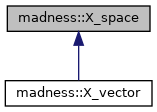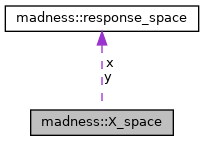#include <x_space.h>
|
| template<typename T > |
| auto | binary_apply (const X_space &A, const X_space &B, T &func) -> X_space |
| |
| template<class T > |
| auto | binary_inplace (X_space &A, const X_space &B, const T &func) |
| |
| auto | inner (const X_space &A, const X_space &B) -> Tensor< double > |
| | Computes the matrix elements between two response spaces.
|
| |
| auto | inplace_apply (X_space &A, const std::function< void(vector_real_function_3d &)> &func) -> void |
| |
| auto | oop_apply (const X_space &A, const std::function< vector_real_function_3d(const vector_real_function_3d &)> &func, bool fence=true) -> X_space |
| | Apply a function to the X_space.
|
| |
| X_space | operator* (const double &b, const X_space &A) |
| |
| auto | operator* (const Function< double, 3 > &f, const X_space &A) -> X_space |
| |
| X_space | operator* (const X_space &A, const double &b) |
| |
| X_space | operator* (const X_space &A, const Function< double, 3 > &f) |
| |
| auto | operator* (const X_space &A, const Tensor< double > &b) -> X_space |
| |
| X_space | operator* (const X_space &B, const X_space &A) |
| |
| auto | operator+ (const X_space &A, const X_space &B) -> X_space |
| |
| X_space | operator- (const X_space &A, const X_space &B) |
| |
| auto | same_size (const X_space &A, const X_space &B) -> bool |
| |
| auto | size_orbitals (const X_space &x) -> size_t |
| |
| auto | size_states (const X_space &x) -> size_t |
| |
◆ X_space() [1/3]
| madness::X_space::X_space |
( |
| ) |
|
|
inline |
◆ X_space() [2/3]
| madness::X_space::X_space |
( |
const X_space & |
A | ) |
|
|
inline |
◆ X_space() [3/3]
| madness::X_space::X_space |
( |
World & |
world, |
|
|
size_t |
n_states, |
|
|
size_t |
n_orbitals |
|
) |
| |
|
inline |
◆ clear()
| void madness::X_space::clear |
( |
| ) |
|
|
inline |
◆ component_norm2s()
| auto madness::X_space::component_norm2s |
( |
| ) |
const -> Tensor<double> |
|
inline |
◆ compress()
| void madness::X_space::compress |
( |
| ) |
const |
|
inline |
◆ copy() [1/2]
| X_space madness::X_space::copy |
( |
| ) |
const |
|
inline |
◆ copy() [2/2]
Create a new copy of the function with different distribution and optional fence Works in either basis. Different distributions imply asynchronous communication and the optional fence is collective.
References X_space(), madness::copy(), x, and y.
◆ from_vector()
◆ norm2s()
| auto madness::X_space::norm2s |
( |
| ) |
const -> Tensor<double> |
|
inline |
◆ num_orbitals()
| size_t madness::X_space::num_orbitals |
( |
| ) |
const |
|
inline |
◆ num_states()
| size_t madness::X_space::num_states |
( |
| ) |
const |
|
inline |
◆ operator+=()
◆ operator=()
◆ pop_back()
| void madness::X_space::pop_back |
( |
| ) |
|
|
inline |
◆ push_back()
◆ reconstruct()
| void madness::X_space::reconstruct |
( |
| ) |
const |
|
inline |
◆ reset_active()
| void madness::X_space::reset_active |
( |
| ) |
|
|
inline |
◆ set_active()
| void madness::X_space::set_active |
( |
const std::list< size_t > & |
new_active | ) |
|
|
inline |
◆ to_vector()
◆ truncate() [1/2]
| void madness::X_space::truncate |
( |
| ) |
|
|
inline |
◆ truncate() [2/2]
| void madness::X_space::truncate |
( |
double |
thresh | ) |
|
|
inline |
◆ zero_functions()
| static X_space madness::X_space::zero_functions |
( |
World & |
world, |
|
|
size_t |
n_states, |
|
|
size_t |
n_orbitals |
|
) |
| |
|
inlinestatic |
◆ binary_apply
◆ binary_inplace
◆ inner
◆ inplace_apply
◆ oop_apply
Apply a function to the X_space.
- Parameters
-
- Returns
◆ operator* [1/6]
◆ operator* [2/6]
◆ operator* [3/6]
◆ operator* [4/6]
◆ operator* [5/6]
◆ operator* [6/6]
◆ operator+
◆ operator-
◆ same_size
◆ size_orbitals
| auto size_orbitals |
( |
const X_space & |
x | ) |
-> size_t |
|
friend |
◆ size_states
| auto size_states |
( |
const X_space & |
x | ) |
-> size_t |
|
friend |
◆ active
| std::list<size_t> madness::X_space::active |
◆ n_orbitals
| size_t madness::X_space::n_orbitals |
|
private |
◆ n_states
| size_t madness::X_space::n_states |
|
private |
Referenced by madness::X_vector::X_vector(), clear(), component_norm2s(), compress(), copy(), madness::X_vector::copy(), copy(), madness::copyToVector(), madness::copyToXspace(), from_vector(), molresponseExchange(), norm2s(), pop_back(), push_back(), reconstruct(), reset_active(), set_active(), and to_vector().
Referenced by madness::X_vector::X_vector(), clear(), copy(), madness::X_vector::copy(), copy(), madness::copyToVector(), madness::copyToXspace(), from_vector(), pop_back(), push_back(), reset_active(), set_active(), and to_vector().
The documentation for this struct was generated from the following file:

